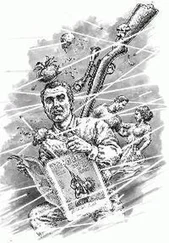Аврам Дэвидсон - Peregrine - primus
Здесь есть возможность читать онлайн «Аврам Дэвидсон - Peregrine - primus» весь текст электронной книги совершенно бесплатно (целиком полную версию без сокращений). В некоторых случаях можно слушать аудио, скачать через торрент в формате fb2 и присутствует краткое содержание. Год выпуска: 1971, ISBN: 1971, Издательство: New York : Walker, Жанр: sf_all, на английском языке. Описание произведения, (предисловие) а так же отзывы посетителей доступны на портале библиотеки ЛибКат.
- Название:Peregrine : primus
- Автор:
- Издательство:New York : Walker
- Жанр:
- Год:1971
- ISBN:0802755461
- Рейтинг книги:5 / 5. Голосов: 1
-
Избранное:Добавить в избранное
- Отзывы:
-
Ваша оценка:
- 100
- 1
- 2
- 3
- 4
- 5
Peregrine : primus: краткое содержание, описание и аннотация
Предлагаем к чтению аннотацию, описание, краткое содержание или предисловие (зависит от того, что написал сам автор книги «Peregrine : primus»). Если вы не нашли необходимую информацию о книге — напишите в комментариях, мы постараемся отыскать её.
Peregrine : primus — читать онлайн бесплатно полную книгу (весь текст) целиком
Ниже представлен текст книги, разбитый по страницам. Система сохранения места последней прочитанной страницы, позволяет с удобством читать онлайн бесплатно книгу «Peregrine : primus», без необходимости каждый раз заново искать на чём Вы остановились. Поставьте закладку, и сможете в любой момент перейти на страницу, на которой закончили чтение.
Интервал:
Закладка:
The Captain of the Sailing-barge Homoiousios, however, observed a thirdly, “ You aren’t listed on my passenger-roster!” he exclaimed. “You haven’t paid any fare! You are a stowaway, woman!’’
Sister Pulchrituda hung her comely head.
Matron Eudoxia, however, had other thoughts.
“Forgive you, huh? Sure, I’ll forgive you. After I finish turning you into catsmeat for what you made me do to my sweet and actually unoffending little kiddy, here—” And she heaved herself half-way to her feet, with a sullen set to her jaw.
Peregrine hastily stepped forward. “Matron, allow me to introduce you to a former acquaintance of mine,” he said, and Eudoxia, still half-way to her feet, paused and allowed her eyes to wander from his face to his breech-clout and back again and he went on to say, “Matron Eudoxia, may I present to you Sister Pulchrituda, one of the only three authentic and intact Vestal Virgins. Sister Pulchrituda, Matron Eudoxia. —I hope,” he said, earnestly, “that mere differences in religious preferences will not prevent you from becoming fast friends.”
Eudoxia took one last and lingering look at his breech-clout, and rose rapidly to her feet, wiping her hands on her hips. “Why, perish the absolute thought!” she urged. “One of the only three authentic and intact Vestal whats?”
“Virgins,” said Peregrine. “Sworn to chastity and poverty, you know,” he added.
“Well, don’t you worry about poverty!’’ said the matron in hearty and can-I-believe-my-ears tones. “Honey, you and I are going to be very good friends in -deed. Poverty, huh? Why,
honey, don’t you know that you’re sitting on a fortune?”
Penurious Augustus, who had been looking and listening, and, towards the last, nodding very, very slowly, now suddenly looked up. His jaws fell, he shouted, fell upon his bags and hugged them as though they were imperiled and dearly-beloved children. “O my bezants and my solidi!” hegasped. “You damned bargee, look where you’ve led us! Get us out of here at once, at once, do you hear?—or else restore my fare to me immediately—”
“Yes,” said Peregrine, following his eyes, “or we will all need it to pay some other fares to Charon.”
For Eugenius of Eddessa, intent, first upon the fight and then upon the introductions, had allowed his barge to sink her nose into a sand-bar—hastily he let out all the reefs in his sails—hastily did Appledore shrilly whistle for to raise a wind—other shrill whistles and shrill whoops and bloodcurdling screams drowned out the philosopher’s whistle—for between the sandbar and the shore was shallow, and the waters of the shallows were now being beaten into froth by the hooves of a multitude of horses—and Eudoxia moaned, “There goes the biggest goddamned fee any whorehouse ever had a chance to earn—‘intact’ did he say? Well, not for long, honey. Not for long . .
Squatty, bent to the backs of their wild little horses, screaming and whistling and whooping and hooting and waving their infamous spiked flails, the riders in the shallows came down incredibly fast upon the vessel. Claud grabbed Philoxena and flung her over his shoulder and leaped the aft rail, as she screamed, vigorously, “The Huns! O Holy Martyred Protopresbyters of Paphlagonia! The Huns!
Eudoxia, once again, flung her arms around Peregrine, imploring him to save her, save her, save her—
This time, however, it was level daylight and there were no concealing walls with unfrequented streets behind them. He patted her on her ample back, saying, “There, there,” and then to the aghast Eugenius he said, wryly, “Well, today we may go to stool without stooping.”
And the hordes of the Huns raced up and all around.
Table caption_
PART
—
T he Hun hordes filled the scene as far as the eye could reach; however, there in that bend of the river, sunken rather deep between over-hanging bluffs, the eye could not reach very far. Emotion aboard the sailing-barge Homoiousios was in a state of flux. Augustus the Penurious, for example, even rose up a little ways off his bags of baggage and surveyed his captors with something like, first, surprise, and second, a rather cautious gratification. And in a moment, when one of the Huns rode, splashing, up to the side, his thin mouth open in a cruel and hungry leer, Augustus even rose to his full height as though the better to be seen'. Then he gave a satisfied nod, and spoke.
“Hail,” he said. “Ave Attila IV, Grand Hetman of the Hun Hordes, Scourge of God, King of Hun Horde Number Seventeen, and,” and here he cleared his throat and gave a meaningful glance at the Hun on the horse, “and Ally of the Central Roman Empire. Hem.”
The man so^addressed seemed by no means totally pleased to have been identified so precisely. He rode even nearer, he squint
ed and scowled, then he spat.
“What?” he asked. “You Gustav Caesar Twenny-fi’?”
“Even so.”
The Hun king plucked off his exceedingly greasy little fur bonnet and cast it into the water, and endeavored to direct his horse to trample on it. “Goddamn,” he muttered. “Sunnamabitch Caesar, all-same ally. Rotten roundeyes fucken foreign-devil king. Oh, sit. Horse-sit.” Then he wheeled about to confront his hordesmen, who had already begun to clamber up the sides of the vessel, barking whinnying sounds in his native tongue (if such it could be denominated; perhaps palate or glottis would be better), breaking into the common vernacular in another moment.
“No rob sip!” he yelled. “All-same ally sip. Sit!”
One of the hordesmen commencing to contend this diplomatic decision, the King of Hun Horde Number Seventeen at once whirled his flail and brought it down with a thunk upon the man’s skull. The man scowled sullenly, slowly withdrew, ignoring the blood streaming down onto his seamed face, whereon any number of scars and scabs testified to past recalcitrancies. A mutter began among the horsemen, to whom the niceties of the laws of nations perhaps meant less than to others. Appledore at this point stepped forward, suddenly re-assuming, for the first time since having left Sapodilla, his role as a capella bard.
I sing the curses of civilized men [he sang] Upon the accursed Hordes of Huns, most Vile and most vicious of vermin: Woe!
The most vile and most vicious of vermin broke off their muttering, and looked at the bard from their tiny and blood-shot eyes, whilst small and appreciative twitches began to play around the corners of their flat mouths.
Dreading to declare how they burned The basilicas, 1 lift up my voice to Mourn the moment they impaled priests And benightedly buggered the bishops: Woe!
The hordesmen simpered, looking around from under their scanty eyelashes. The dirty toes of Attila IV curled in his
plaited-grass stirrups, and his lower lip thrust forward, he shuffled in his seat, and in general gave the impression that if he were on dry land he would have dug his toes into the ground in a pleasurable embarrassment at hearing himself praised.
Alas, how the inhuman Huns violated the Virgins, vigorously ignored their shrieks And crushed the craniums of the innocent Acolytes, like unto over-ripe apples: Woe!
Attila IV giggled, broke out in a slight blush, and looked the rather helpless look of the innately modest man who is overcome at the mention of his own praises, and simply doesn’t know which way to turn. Finally it was all too much for him, he broke forth into a delighted guffaw; then, summoning a stern gaze which tended to wobble a bit, he said, “Enough, sing-song man. You sing plenty-good. Me gib you gift.” He barked an order, and one of his men lifted himself slightly off what appeared to be a saddle done in red mauretanian leather, but which proved to be a steak of horse-meat, fibres well-tenderized beneath the Hun’s half-breeched buttock; and handed it to Appledore. The best allout a capella bard turned slightly green.
Читать дальшеИнтервал:
Закладка:
Похожие книги на «Peregrine : primus»
Представляем Вашему вниманию похожие книги на «Peregrine : primus» списком для выбора. Мы отобрали схожую по названию и смыслу литературу в надежде предоставить читателям больше вариантов отыскать новые, интересные, ещё непрочитанные произведения.
Обсуждение, отзывы о книге «Peregrine : primus» и просто собственные мнения читателей. Оставьте ваши комментарии, напишите, что Вы думаете о произведении, его смысле или главных героях. Укажите что конкретно понравилось, а что нет, и почему Вы так считаете.






